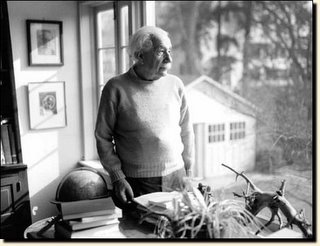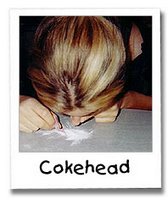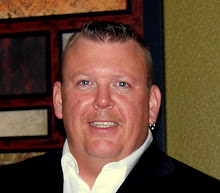First, a few lines from one of my favorite essays:
"How strange is the lot of us mortals! Each of us is here for a brief sojourn; for what purpose he knows not, though he sometimes thinks he senses it. But without deeper reflection one knows from daily life that one exists for other people -- first of all for those upon whose smiles and well-being our own happiness is wholly dependent, and then for the many, unknown to us, to whose destinies we are bound by the ties of sympathy. The ideals that have lighted my way, and time after time have given me new courage to face life cheerfully, have been Kindness, Beauty, and Truth.
My political ideal is democracy. Let every man be respected as an individual and no man idolized. I am quite aware that for any organization to reach its goals, one man must do the thinking and directing and generally bear the responsibility. But the led must not be coerced, they must be able to choose their leader. In my opinion, an autocratic system of coercion soon degenerates; force attracts men of low morality... The really valuable thing in the pageant of human life seems to me not the political state, but the creative, sentient individual, the personality; it alone creates the noble and the sublime, while the herd as such remains dull in thought and dull in feeling.
This topic brings me to that worst outcrop of herd life, the military system, which I abhor... This plague-spot of civilization ought to be abolished with all possible speed. Heroism on command, senseless violence, and all the loathsome nonsense that goes by the name of patriotism -- how passionately I hate them!
The most beautiful experience we can have is the mysterious. It is the fundamental emotion that stands at the cradle of true art and true science. Whoever does not know it and can no longer wonder, no longer marvel, is as good as dead, and his eyes are dimmed. It was the experience of mystery -- even if mixed with fear -- that engendered religion. A knowledge of the existence of something we cannot penetrate, our perceptions of the profoundest reason and the most radiant beauty, which only in their most primitive forms are accessible to our minds: it is this knowledge and this emotion that constitute true religiosity. In this sense, and only this sense, I am a deeply religious man... I am satisfied with the mystery of life's eternity and with a knowledge, a sense, of the marvelous structure of existence -- as well as the humble attempt to understand even a tiny portion of the Reason that manifests itself in nature."
Albert Einstein
Read more at www.aip.org/history/ein...
Now for a few questions. I offer these up for discussion, although there are no obvious answers. I certainly have none and am truly interested in exploring these ideas with an open mind.

1) Is the struggle to survive, as an organism and as a species, our most primal and inescapable implulse, acting as the driving force behind such other base instincts as eating and procreating?
2) Is it true, as seems to be demonstrated by biology, history, psychology, etc. that all animals, including we humans, are not only capable, but biologocally programmed for violence, given proper stimulus?
3) If we understand, as an individuals or as a collective groups, i.e. a nation, that we may someday face agression, do we then not have a biological and socialogical obligation to prepare for and employ a forceful defense?
4) Is war a sociological extrapolation of individual humans primary impulses i.e. violence bred by hunger, oppression, etc.?
5) Is war inescapable? Period.
6) Can mankind, as an evolved intelligence, choose behaviors that run counter to apparent biological implulse?
7) Can humanity someday put an end to war, hunger, disease etc. by force of will and application of intelligent social engineering?

8) In Desolation Angels, Jack Kerouac speaks of the Holy Primative, a figure representing mans place midway between beasts and gods. Will we ever split the angel from the animal and achieve the utopian dream?
I don't know, but it's worth discussing.

"How strange is the lot of us mortals! Each of us is here for a brief sojourn; for what purpose he knows not, though he sometimes thinks he senses it. But without deeper reflection one knows from daily life that one exists for other people -- first of all for those upon whose smiles and well-being our own happiness is wholly dependent, and then for the many, unknown to us, to whose destinies we are bound by the ties of sympathy. The ideals that have lighted my way, and time after time have given me new courage to face life cheerfully, have been Kindness, Beauty, and Truth.
My political ideal is democracy. Let every man be respected as an individual and no man idolized. I am quite aware that for any organization to reach its goals, one man must do the thinking and directing and generally bear the responsibility. But the led must not be coerced, they must be able to choose their leader. In my opinion, an autocratic system of coercion soon degenerates; force attracts men of low morality... The really valuable thing in the pageant of human life seems to me not the political state, but the creative, sentient individual, the personality; it alone creates the noble and the sublime, while the herd as such remains dull in thought and dull in feeling.
This topic brings me to that worst outcrop of herd life, the military system, which I abhor... This plague-spot of civilization ought to be abolished with all possible speed. Heroism on command, senseless violence, and all the loathsome nonsense that goes by the name of patriotism -- how passionately I hate them!
The most beautiful experience we can have is the mysterious. It is the fundamental emotion that stands at the cradle of true art and true science. Whoever does not know it and can no longer wonder, no longer marvel, is as good as dead, and his eyes are dimmed. It was the experience of mystery -- even if mixed with fear -- that engendered religion. A knowledge of the existence of something we cannot penetrate, our perceptions of the profoundest reason and the most radiant beauty, which only in their most primitive forms are accessible to our minds: it is this knowledge and this emotion that constitute true religiosity. In this sense, and only this sense, I am a deeply religious man... I am satisfied with the mystery of life's eternity and with a knowledge, a sense, of the marvelous structure of existence -- as well as the humble attempt to understand even a tiny portion of the Reason that manifests itself in nature."
Albert Einstein
Read more at www.aip.org/history/ein...
Now for a few questions. I offer these up for discussion, although there are no obvious answers. I certainly have none and am truly interested in exploring these ideas with an open mind.

1) Is the struggle to survive, as an organism and as a species, our most primal and inescapable implulse, acting as the driving force behind such other base instincts as eating and procreating?
2) Is it true, as seems to be demonstrated by biology, history, psychology, etc. that all animals, including we humans, are not only capable, but biologocally programmed for violence, given proper stimulus?
3) If we understand, as an individuals or as a collective groups, i.e. a nation, that we may someday face agression, do we then not have a biological and socialogical obligation to prepare for and employ a forceful defense?
4) Is war a sociological extrapolation of individual humans primary impulses i.e. violence bred by hunger, oppression, etc.?
5) Is war inescapable? Period.
6) Can mankind, as an evolved intelligence, choose behaviors that run counter to apparent biological implulse?
7) Can humanity someday put an end to war, hunger, disease etc. by force of will and application of intelligent social engineering?

8) In Desolation Angels, Jack Kerouac speaks of the Holy Primative, a figure representing mans place midway between beasts and gods. Will we ever split the angel from the animal and achieve the utopian dream?
I don't know, but it's worth discussing.





